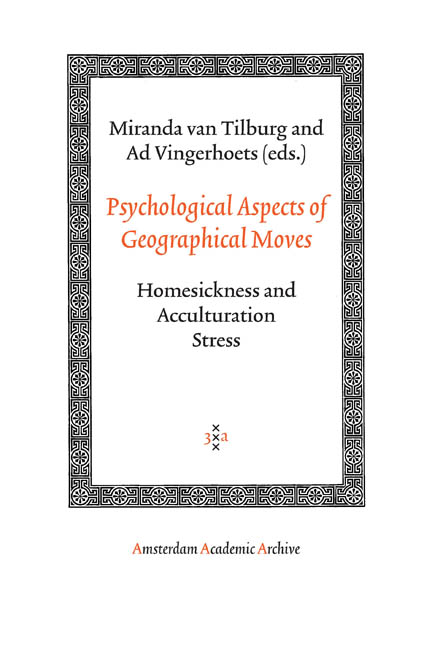Book contents
- Frontmatter
- Preface
- Contents
- Contributors
- 1 The Homesickness Concept: Questions and Doubts
- 2 Culture Shock, Homesickness, and Adaptation to a Foreign Culture
- 3 The Psychological Context of Homesickness
- 4 Geographical Moves and Psychological Adjustment
- 5 Homesickness and Acculturation Stress in the International Student
- 6 Psychological and Psychosocial Adjustment of Migrants: Families in a Changing Environment
- 7 Individual Differences in Acculturative Stress Reactions: Determinants of Homesickness and Psychosocial Maladjustment
- 8 The Cry for the Lost Placenta: Cultural Bereavement and Cultural Survival among Cambodians who Resettled, were Repatriated, or Stayed at Home
- 9 Children's Coping with Homesickness: Phenomenology and Intervention
- 10 Homesickness after Relocation during Early Adolescence
- 11 Personality, Temperament, and Homesickness
- 12 Homesickness, Personality and Personality Disorders: An Overview and Therapeutic Considerations
- 13 Health Issues in International Tourism: The Role of Health Behavior, Stress and Adaptation
- 14 Development of Psychopathology in International Tourists
- Miscellaneous Endmatter
14 - Development of Psychopathology in International Tourists
Published online by Cambridge University Press: 23 January 2021
- Frontmatter
- Preface
- Contents
- Contributors
- 1 The Homesickness Concept: Questions and Doubts
- 2 Culture Shock, Homesickness, and Adaptation to a Foreign Culture
- 3 The Psychological Context of Homesickness
- 4 Geographical Moves and Psychological Adjustment
- 5 Homesickness and Acculturation Stress in the International Student
- 6 Psychological and Psychosocial Adjustment of Migrants: Families in a Changing Environment
- 7 Individual Differences in Acculturative Stress Reactions: Determinants of Homesickness and Psychosocial Maladjustment
- 8 The Cry for the Lost Placenta: Cultural Bereavement and Cultural Survival among Cambodians who Resettled, were Repatriated, or Stayed at Home
- 9 Children's Coping with Homesickness: Phenomenology and Intervention
- 10 Homesickness after Relocation during Early Adolescence
- 11 Personality, Temperament, and Homesickness
- 12 Homesickness, Personality and Personality Disorders: An Overview and Therapeutic Considerations
- 13 Health Issues in International Tourism: The Role of Health Behavior, Stress and Adaptation
- 14 Development of Psychopathology in International Tourists
- Miscellaneous Endmatter
Summary
Introduction
Each year many western habitants take a holiday abroad. Worldwide the tourism flow is growing. In general, holidays are associated with positive experiences. Holidays are thought of as being a welcome change for today's hectic life. Many of us feel free and relaxed when on a holiday. However, problems can and do arise. In period from 1994 until 2004, there was an increase of approximately 23,500 to about 45,000 in the number of requests for assistance by Dutch international tourists. Surprisingly, the number of requests associated with psychic problems remained rather constant (approximately 500) over this period. Psychoses and other forms of severe psychopathology are not exceptional. It is clear that the development of psychopathology is not restricted to one's own habitat. However, very little is known about the causes and consequences of developing psychopathologies abroad.
This chapter focuses on possible causes, treatment and repatriation of those who develop psychopathologies when on a holiday abroad. In addition, a theoretical framework will be presented. First, however, two cases will be described, to give the reader an impression of the kind of psychiatric problems alarm centers are confronted with.
Two cases
Case A
A 23-year-old woman went on a honeymoon. She delivered the mail for several years. Until a few days before her marriage she did her job, because she wanted to save as much days as possible for their honeymoon to South America. She married her husband, a physiotherapist, on Friday and they left for South America on Saturday. At their destination, the bridal suite appeared to be double booked and they were transferred to another room. On the second day her purse, containing her valuables, was stolen. The next two days she hardly got any sleep and on the fourth day she became agitated and paranoid, resulting one day later in a psychosis. With the exception of her husband, everyone she was confronted with was brutalized. She walked around the hotel and harassed the other guests. A Dutch alarm center was contacted and two days later she flew back, accompanied by a nurse. Back in The Netherlands she was admitted to a hospital. Two months later she was dismissed in a good condition and took up her job again.
- Type
- Chapter
- Information
- Psychological Aspects of Geographical MovesHomesickness and Acculturation Stress, pp. 213 - 226Publisher: Amsterdam University PressPrint publication year: 2006



